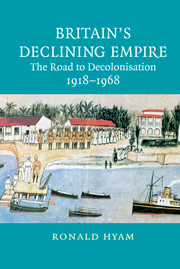Book contents
- Frontmatter
- Contents
- List of illustrations
- Maps
- Preface
- List of abbreviations
- Introduction
- 1 ‘The whole world is rocking’: British governments and a dysfunctional imperial system, 1918–1945
- 2 ‘British imperialism is dead’: the Attlee government and the end of empire, 1945–1951
- 3 ‘Rugged and tangled difficulties’: the Churchill and Eden governments and the end of empire, 1951–1956
- 4 ‘The wind of change is blowing’: the Macmillan and Douglas-Home governments and the end of empire,1957–1964
- 5 'We could no longer afford to honour our pledges': the Wilson government and the end of empire, 1964–1968
- Epilogue
- Appendix
- Select bibliography
- Index
2 - ‘British imperialism is dead’: the Attlee government and the end of empire, 1945–1951
Published online by Cambridge University Press: 05 June 2014
- Frontmatter
- Contents
- List of illustrations
- Maps
- Preface
- List of abbreviations
- Introduction
- 1 ‘The whole world is rocking’: British governments and a dysfunctional imperial system, 1918–1945
- 2 ‘British imperialism is dead’: the Attlee government and the end of empire, 1945–1951
- 3 ‘Rugged and tangled difficulties’: the Churchill and Eden governments and the end of empire, 1951–1956
- 4 ‘The wind of change is blowing’: the Macmillan and Douglas-Home governments and the end of empire,1957–1964
- 5 'We could no longer afford to honour our pledges': the Wilson government and the end of empire, 1964–1968
- Epilogue
- Appendix
- Select bibliography
- Index
Summary
Some years before he became prime minister, probably in 1942 when he was secretary of state for dominion affairs, Attlee set down his thoughts on post-war colonial policy. ‘The colonial problem will not be solved’, he wrote, ‘by a combination of an eye to business and humanitarian sentiment. Nor on the other hand will it be solved by looking backwards and imagining that we can recreate the conditions of a past age.’ Britain must therefore, he concluded, ’set aside sentimental imperialism and take a realist view of our problems’. He believed they were committed to giving India self-government (treating India as ‘a political entity with which an accommodation has to be reached’). As far as the rest of Asia was concerned, he considered that it consisted of ‘a group of peoples on the way towards self-government requiring tutelage for many years yet and susceptible to much economic development which should be directed primarily to the welfare of the indigenous populations and to the general service of the world’. He did not mention Africa.
Four years later, in August 1946, an official Labour government publicity hand-out declared ‘British “Imperialism” is dead, in so far as it ever existed, except as a slogan used by our critics’; colonial policy was being approached in a way that was ‘both liberal and dynamic’.
- Type
- Chapter
- Information
- Britain's Declining EmpireThe Road to Decolonisation, 1918–1968, pp. 94 - 167Publisher: Cambridge University PressPrint publication year: 2007



